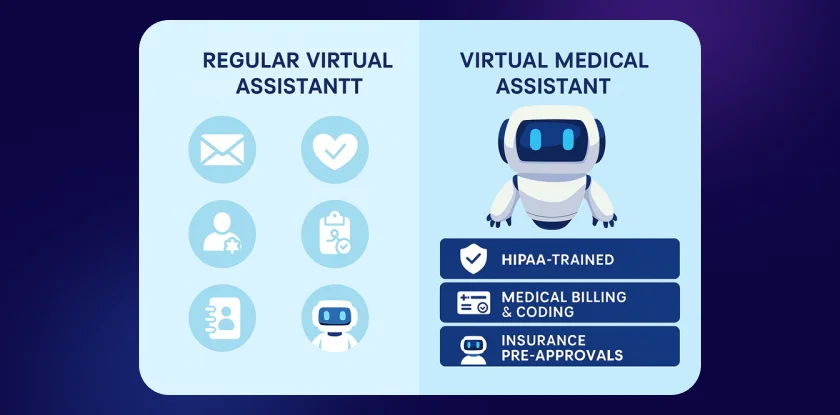Health is a priority! Paperwork sometimes plays a hindrance factor in the effectiveness of providing proper care. But it needs to STOP!
Here’s some good news: AI-powered chatbots for physicians and healthcare virtual assistants (VMAs) are actually fixing this problem
Doctors feel good about this upgrade, and it has changed the perspective of patients too. We’re seeing medical practices save 40% on costs while their patient happiness scores go up by 35%.
What Exactly is a Virtual Medical Assistant?
They’re trained healthcare professionals who understand medical rules like HIPAA. They can use your computer systems easily and handle everything from booking patient appointments to dealing with insurance paperwork.
A virtual assistant for physicians costs much less than hiring someone to work in your office, and they often have better skills.
Here’s the real deal about what a healthcare chatbot actually does. You know that amazing office person who keeps your practice running without problems?
They work remotely, cost about half as much, and you don’t need to provide health insurance or office space for them.
Virtual assistants for physicians aren’t just regular virtual assistants who learned a few medical words. These people live and breathe healthcare work every day.
They’ve dealt with difficult insurance companies, they understand why getting approval for treatments takes so long, and they actually know what you mean when you say “check if insurance covers this before the patient comes in.”
How Virtual Medical Assistants Are Different from Regular Virtual Assistants

Special Training:
VMAs don’t need you to explain what medical codes mean. They already know because they have:
- Real knowledge of medical terms
- HIPAA training that they follow naturally, not just as a checklist
- Hands-on experience with major medical computer systems like Epic and Cerner
- Often, backgrounds in medical billing can save your practice money
Healthcare-Specific Skills:
- They fight with insurance companies for treatment approvals, so you don’t have to
- They verify insurance coverage that’s actually accurate
- They manage medical records without making you want to quit
- They talk to patients professionally
Following Medical Rules:
- They understand that HIPAA compliance isn’t optional
- Keeping patient information private is automatic for them
- They document everything correctly the first time
Why Healthcare Organizations Are Quickly Using Virtual Medical Assistants?

Let me share some numbers that really surprised me:
- 68% of medium-sized hospitals are already using remote office staff
- Healthcare VMAs typically save practices about 40% in costs
- Patient happiness scores go up around 35%
- This market is growing fast, 26.29% every year through 2029
But honestly, these numbers don’t tell the complete story. A medical AI chatbot is already reshaping how patients and providers interact. Let me explain what’s really happening in healthcare today.
The Paperwork Problem Is Getting Worse
Your doctors went to medical school to help sick people, not to spend 15.5 hours every week filling out forms (that’s according to the American Medical Association). VMAs give doctors their time back so they can focus on patients. It’s that simple.
Operating Costs Keep Going Up
A typical $45,000 base salary is paid for office staff, plus another 30-40% for benefits like health insurance, plus the cost of office space and equipment.
When you add it all up, it’s expensive. A VMA doing the same work for much less per year? That’s real money saved that goes back into your practice.
Growing Your Practice Is Hard
Here’s what I really like about VMAs: if you need more help next month, you can add another one quickly. No posting job ads, no interviews, no training someone from the beginning. It’s like having office support whenever you need it.
Patients Can’t Reach You
We’ve all called a doctor’s office and been stuck listening to hold music forever, right? VMAs can answer phones when your office is really busy or even after regular hours. Your patients actually get through to talk to someone. What a concept!
What Virtual Medical Assistants Do Every Day?
Managing Patient Appointments
This is much more than just booking appointments:
- Managing multiple doctor schedules without double-booking patients
- Sending appointment reminders through text, email, or phone calls
- Filling cancelled appointment slots from waiting lists
- Setting up patients for video visits without technical problems
- Making sure exam rooms are assigned properly
Handling Medical Records and Paperwork
The behind-the-scenes work that keeps everything organized:
- Entering patient information accurately into computer systems
- Putting together complete medical histories
- Making sure lab test results get to the right patient files
- Processing prescription refill requests properly
- Converting paper files into searchable computer files
- Handling requests for medical records while following privacy laws
- Keeping quality reporting up to date
Managing Money and Insurance
This is where VMAs really prove their worth:
- Checking insurance coverage before patients arrive (no more billing surprises)
- Fighting with insurance companies for treatment approvals
- Submitting insurance claims that get paid the first time
- Following up on unpaid bills in a friendly but firm way
- Explaining medical bills to patients in simple terms
- Fighting insurance denials with determination
- Keeping track of money owed to the practice
- Setting up payment plans that patients can actually afford
Talking with Patients
Your VMAs become the voice of your practice:
- Answering phone calls promptly
- Teaching patients how to use your online patient portal
- Following up after appointments to see how patients are doing
- Sharing health information in easy-to-understand language
- Running patient satisfaction surveys and using the feedback
- Managing your online reputation and reviews
- Keeping patients engaged between visits
Special Support Services
The advanced stuff that makes your practice stand out:
- Running your telehealth appointments smoothly
- Converting voice recordings into written notes
- Coordinating referrals to specialists without dropping the ball
- Managing medical supplies so you don’t run out
- Handling social media professionally
- Supporting research projects
- Tracking quality improvement data
Should Your Practice Get a Virtual Medical Assistant?
You Need a VMA If:
- Your doctors waste over 20% of their time on paperwork.
- Rising costs are hurting your practice’s finances.
- Patients say they can’t reach your office.
- You can’t grow without hiring more costly staff.
- Your current staff is burnt out and keeps leaving.
- Patients wait over 5 minutes on hold.
- Delays in insurance approval are impacting patient care.
- Billing errors are costing you a lot of money.
Conclusion
Virtual medical assistants are more than a trend. They are essential for healthcare practices that want to thrive and expand.
They allow doctors to spend more time with patients. They save money on operations and boost patient satisfaction with their healthcare experience.
The question isn’t whether you should consider a VMA. The question is: can you afford not to have one?
